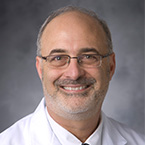
A leader in the areas of molecular biology, signal transduction, and DNA damage and repair, Dr. Kastan spearheaded pivotal investigations that helped to define the networks of signaling pathways that enable cells to deal with exposures to DNA-damaging agents and other cellular stresses. His discoveries have stimulated and continue to be utilized for the development of experimental cancer therapeutics designed to modulate the activity of proteins involved in these processes.
Dr. Kastan’s research has uncovered molecular mechanisms that govern responses to both chemotherapy and radiation therapy and illustrated cross talk between cell signaling, metabolism, and survival. Dr. Kastan ‘s laboratory made the seminal observation that the induction of p53 protein by genotoxic damage blocks entry into S phase, providing the first insights into the biological function of this critical tumor suppressor and establishing the presence of cell cycle checkpoints in mammalian cells. He subsequently showed that ATM is a protein kinase capable of directly phosphorylating p53 and is required for optimal p53 activation in response to ionizing radiation. His discoveries established the initial biochemical steps in what is now called the “DNA damage response” (DDR) pathway and identified a number of critical ATM substrates in the DDR, many of which are encoded by human cancer susceptibility genes. This included discovering that ATM autophosphorylation occurs at the onset of this signaling pathway, a modification that has proven to be an invaluable marker of cellular stress.
Dr. Kastan’s continued work involving ATM has pinpointed additional roles for the protein in modulating mitochondrial function, insulin signaling, and cellular metabolism. His work has also been used to inform drug development efforts pertaining to the establishment of radioprotective agents for normal tissues and radiosensitizers for various tumor types.
Career Highlights
2016 Elected Member, National Academy of Sciences, Washington, D.C.
2014 Elected Fellow, American Association for the Advancement of Science
2014 Elected Fellow, American Academy of Arts and Sciences
2012-2015 Board of Directors, American Association of Cancer Institutes
2009 Elected Member, Institute of Medicine
2007 AACR-GHA Clowes Memorial Award
2003 Elected Member, American Association of Physicians
2002-2012 Editor-in-Chief, Molecular Cancer Research
2001-2004 Chairman, Board of Scientific Counselors, National Cancer Institute
1999-2002 Board of Directors, AACR
1999 Stohlman Award, Leukemia Society of America
1995 Elected Member, American Society for Clinical Investigation
1994-1999 Steven Birnbaum Scholar, Leukemia Society of America